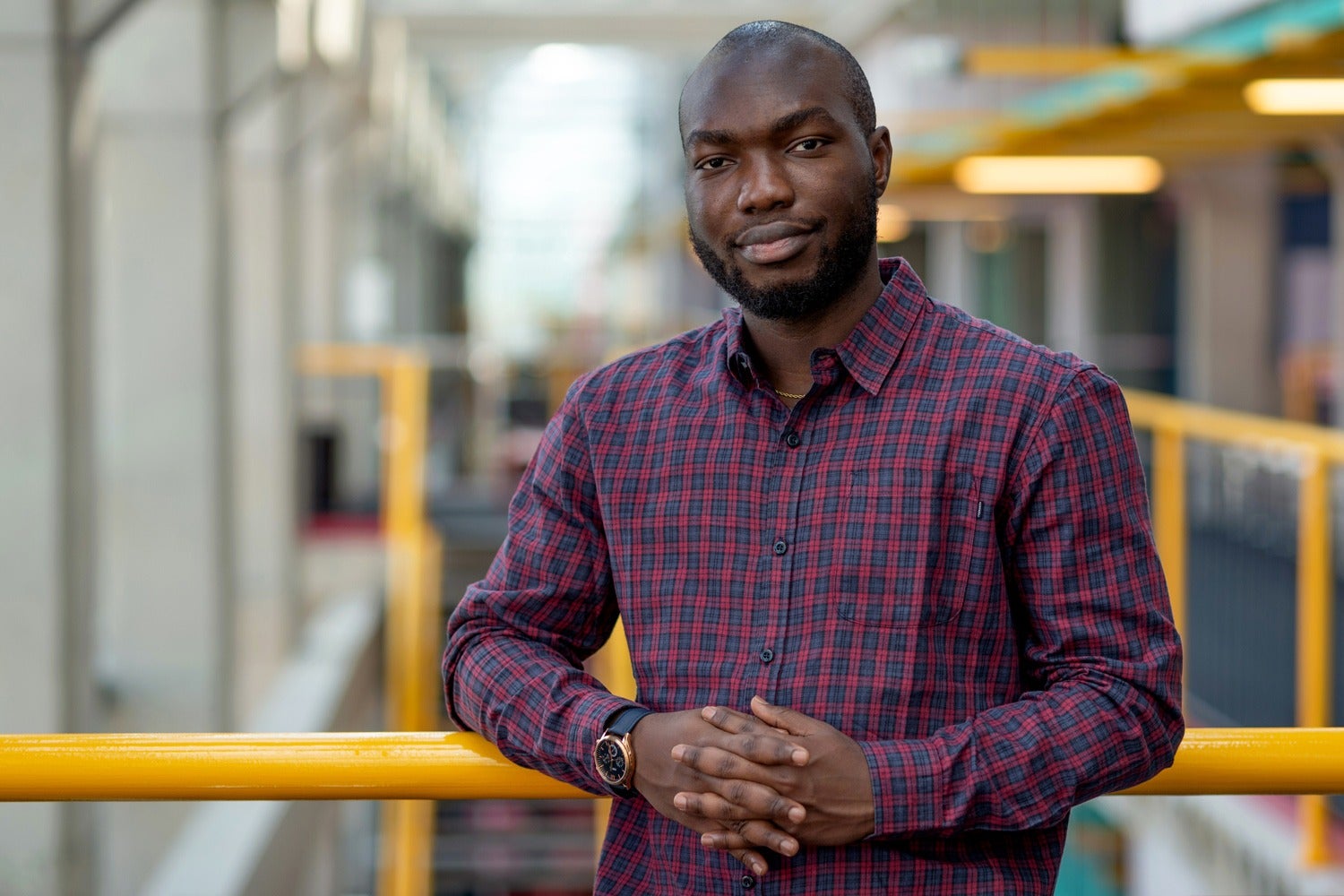Editor:
Brandon Sweet
University Communications
bulletin@uwaterloo.ca
Waterloo launches Black Studies, Anti-Racism diplomas

By Victoria Lumax.
With the University of Waterloo’s formal commitment to anti-racism efforts through the launch of the President’s Anti-Racism Taskforce (PART), various PART working groups were developed to bring forward recommendations on key issues, while PART implementation teams were organized to move immediately to implement specific actions. Importantly, a Black Studies implementation team was formed by the Dean of Arts in 2020. Including professors Vershawn Young, Kathy Hogarth, and Christopher Taylor, the team’s mandate was to explore the creation of programming in Black Studies. This week, the first of the new Black Studies plans received final approval at Senate.
Beginning in fall 2022, “Black Studies” and “Fundamentals of Anti-Racist Communication” will be offered as diplomas open to degree students from all faculties, as well as non-degree and post-degree students.

As a founding member of Waterloo’s Black Faculty Collective, a group of Black scholars working both within and outside the institution to end anti-Black racisms, Professor Young (based in Communication Arts and English, and who goes by dr. vay) has taken a leadership role in the work to create of the Black Studies diplomas and future programming.
“The Black Studies Implementation team, assembled by Dean Sheila Ager, has been working hard to prepare for the programs’ launch,” says dr. vay. “We have consulted diverse groups of curriculum advisors, course developers, institutional supports, departmental members and community leaders to guide the design of Black Studies at Waterloo — an academic offering that will help Canada and beyond make progress toward a more equitable and liberated future.”
The University plans to introduce a major in Black Studies (open to Bachelor of Arts students) and a minor (open to all students in the University) by 2025. In the meantime, Black Studies faculty will be recruited, and community partnerships will be developed.
"We are excited about the opportunities for learning and action that the new diplomas in Black Studies provide for our students, our faculty, and our broader community. It's not enough to say that we're committed to social justice — we want to drive positive change," said Dean Ager.
According to dr. vay, intersectionality — recognizing the interconnected nature of identities such as sexuality, religion, gender, race, age, class and region — will be the key lens through which we undertake Black Studies at UWaterloo. Anti-racist and anti-colonial pedagogy will be the cornerstone of program delivery, and respect for lived experience will be key to student learning. Future focuses for program development are Black entrepreneurship and anti-racist community engagement and consulting.
“Including entrepreneurship would provide learners with the tools to have immediate impact on local business development, Canada’s economy, Black business prowess and interracial relationships,” says dr. vay. “The second theme will equip students to be anti-racism champions in whatever discipline they are pursuing. These prospects give me a lot of hope.”
Black Studies at Waterloo is interdisciplinary and transdisciplinary. Some sample course titles are “Taking B(l)ack History,” “Introduction to Anti-Racist Communication,” “Black Theatre Workshop,” and “Strategic Management of Black Enterprises.”
dr. vay, whose background is in Black Studies, says many students he’s taught or interacted with expressed a desire for more courses that focus on Blackness and he is now looking forward to being able to meet this interest.
“In general, Black Studies isn't well developed across Canada, and I am looking forward to Waterloo becoming a leader in this discipline,” says dr. vay. “The progress that has been made at Waterloo is bittersweet — I believe that a Black Studies program should have always been part of the University curriculum, but this growth is also incredible.”
To learn more about progress made in phase 1 (July 2020 to June 2021) and upcoming phases of the development of Black Studies at the University of Waterloo, visit the Black Implementation Team’s comprehensive report.
Provost, FAUW pres provide update on policy review for teaching stream faculty
Provost James W. E. Rush and Lori Curtis, president of the Faculty Association of the University of Waterloo (FAUW) have circulated a memo that provides an update on the ongoing reviews and revisions of Policy 76 and 77.
"Following receipt of the report of the policy development committee on September 23, the Faculty Relations Committee (FRC), which we co-chair, has spent the majority of our meeting time identifying and discussing the major terms we consider of importance in reshaping the policies," Rush and Curtis write. "This has been a collegial, collaborative, and productive discussion which has resulted in agreement on several major areas."
FRC has agreed on terms related to:
- ranks, progression, and permanence of teaching stream faculty in parallel with current promotion and tenure processes;
- structure and expectations regarding a one-term-in-six professional and pedagogical development term (currently called the “non-teaching term”) and other supports;
- a maximal course teaching load;
- opt-in transitional pathways available for current Lecturers into the new structure;
- discontinuing the rank Lecturer for new appointments;
- restrictions around the cumulative length of definite term appointments within the teaching stream faculty ranks; and
- guidance on the fuller participation of teaching stream faculty in collegial governance and in accessing internal and external funding for which they are eligible.
"FRC will continue to meet with the aim of finalizing terms of agreement by the end of 2021. It is the unanimous opinion of FRC that this work on refining and clarifying the terms in the FRC forum will allow the subsequent policy-writing process to proceed expeditiously, focused on points we have already agreed upon."
"With joint optimism that the spirit of collaboration and shared purpose will continue to guide our discussion through to completion of this process, we commit to updating you again at the end of 2021."
Chief Information Officer Bruce Campbell to retire in August

The University’s Chief Information Officer Bruce Campbell will be retiring on August 1, 2022 after almost 40 years with the University.
“Bruce is a strong believer in partnerships, effective communications, efficient use of resources and a positive work environment,” wrote Jim Rush, vice president, academic & provost in a memo circulated to campus IST staff last week.
Campbell is a Waterloo alumnus, having completed a Bachelor of Mathematics in 1984. Soon after, Bruce joined the Faculty of Engineering, where he served in a number of roles including as software developer, system administrator, network administrator and manager. In 2005 he moved to the Faculty of Science as Manager Science Computing, and in 2007 joined IST as Director of Network Services. In 2013 he became Director of Technology Integrated Services, and in 2016 was permanently appointed to the role of interim Chief Information Officer after a one-year interim appointment.
“Bruce led IST’s contributions to several major system renewals, including: WaterlooWorks; Unit4; Workday, and; the Electronic Health Records system, in order to address risks of end-of-system life solutions and provide new functionality,” Rush writes. “He was involved in the selection and implementation of cloud email solution, Office 365 to provide modern and consistent email services, collaboration and file storage while reducing costs, and prioritized upgrades of the Campus network switching and routing, and WiFi.”
“Bruce established a number of communications initiatives to keep stakeholders and the whole community informed. Bruce established IST’s Data, Information and Analytics team, and data lake, as part of Data as a Strategic Resource initiative, and he oversaw the Campus IT review which will help guide the continuing evolution of IST support of the University.”
“It has been my pleasure to work with Bruce over the past three and a half years and to gain from his immense sense of propriety on both operational as well as long-term strategic issues,” Rush writes. “Please join me in thanking Bruce for his many contributions to the University of Waterloo and in wishing him a happy retirement.”
In his memo, Jim Rush notes that a committee will be established to search for the University’s next CIO in due course.
AfriBERTa brings the power of natural language processing to African languages

Kelechi Ogueji is a master’s student at the Cheriton School of Computer Science advised by Professor Jimmy Lin. His research focuses on low-resource NLP, multilingual language models and transfer learning. Previously, he worked as a machine learning research engineer at InstaDeep, an AI solutions company headquartered in London. Kelechi is also a member of Masakhane, a community of African researchers and stakeholders who conduct NLP research in African languages.
This article was originally pubslished on the Cheriton School of Computer Science website.
Researchers at the Cheriton School of Computer Science have developed a data-efficient pretrained transformed-based neural language model to analyze 11 African languages. Their new neural network model, which they have dubbed AfriBERTa, is based on BERT — Bidirectional Encoder Representations from Transformers — a deep learning technique for natural language processing developed in 2018 by Google.
“Pretrained language models have transformed the way computers process and analyze textual data for tasks ranging from machine translation to question answering,” said Kelechi Ogueji, a master’s student in computer science at Waterloo. “Sadly, African languages have received little attention from the research community.”
Most of these models work using a technique known as pretraining. To accomplish this, the researchers present the model with text where some of the words had been covered up or “masked.” The model’s job is to guess the masked words. By repeating the process many billions of times, using graphics processing units (GPUs) in large data centres, the model learns statistical associations between words that mimic human understanding of language.
For resource-rich languages such as English, it’s easy to find lots of text to pretrain a BERT model. But this has been much more difficult for many other languages where comparable data are not as widely available. As a result, natural language processing capabilities have not been available to many parts of the world, including to large swaths of the African continent.
“One of the challenges is that neural networks are bewilderingly text- and computer-intensive to build,” Kelechi continued. “And unlike English, which has enormous quantities of available text, most of the 7,000 or so languages spoken worldwide can be characterized as low-resource, in that there is a lack of data available to feed data-hungry neural networks.”
Multilingual language models have tried to alleviate the data challenge by simultaneously pretraining on many languages, the conventional wisdom being that knowledge from high-resource languages can carry over to low-resource languages that share certain linguistic similarities. But these models still require lots of data. For example, one popular model called XLM-R is pretrained on 2.4 terabytes of data — more than 164 billion words of text. Even then, coverage of African languages has remained spotty.
AfriBERTa helps to fill this gap by enabling computers to analyze text of African languages for many useful tasks. The model specifically covers 11 languages, including Amharic, Hausa, and Swahili, spoken collectively by more than 400 million people. Importantly, AfriBERTa achieves output quality comparable to the best existing models despite learning from just one gigabyte of text, whereas other models require thousands of times more data. In particular, the researchers discovered that the transfer effects from high- to low-resource languages do not appear necessary to produce a good model.
“Being able to pretrain models that are just as accurate for certain downstream tasks, but using vastly smaller amounts of data has many advantages,” said Jimmy Lin, Cheriton Chair in Computer Science and Kelechi’s advisor. “Needing less data to train the language model means that less computation is required and consequently lower carbon emissions associated with operating massive data centres. Smaller datasets also make data curation more practical, which is one approach to reduce the biases present in the models.”
“This work takes a small but important step to bringing natural language processing capabilities to more than 1.3 billion people on the African continent,” Professor Lin concludes. “Our experiments also highlight important factors to consider when pretraining multilingual models on smaller datasets, presenting some guidance on model architecture that might be applicable to other low-resource languages as well.”
Assisting Kelechi Ogueji and Jimmy Lin in this research is Yuxin Zhu, who recently completed an undergraduate degree in computer science at Waterloo.
To learn more about the research on which this feature is based, please see Kelechi Ogueji, Yuxin Zhu, Jimmy Lin, “Small Data? No Problem! Exploring the Viability of Pretrained Multilingual Language Models for Low-resourced Languages.”
Their research is being presented at the First Workshop on Multilingual Representation Learning at EMNLP 2021, the 2021 Conference on Empirical Methods in Natural Language Processing. The AfriBERTa code, data and models are available at the AfriBERTa Github.
Link of the day
International Day for Tolerance
When and Where to get support
Students can visit the Student Success Office online for supports including academic development, international student resources, immigration consulting, leadership development, exchange and study abroad, and opportunities to get involved.
Instructors looking for targeted support for developing online components for blended learning courses, transitioning remote to fully online courses, revising current online courses, and more please visit Agile Development | Centre for Extended Learning | University of Waterloo (uwaterloo.ca).
Instructors can visit the Keep Learning website to get support on adapting their teaching and learning plans for an online environment.
Course templates are available within your course in LEARN to help you build and edit your content and assignment pages quickly.
The following workshops, webinars, and events are offered by the KL team (CTE, CEL, ITMS, LIB):
- Independent Remote Course Design Essentials, self-directed, continuous self-enrollment course in LEARN.
- Independent Blended Course Design (iBlend), self-directed, ongoing
- Copyright Overview for Waterloo Instructors and Staff - self-directed, continuous self-enrollment course in LEARN.
-
Thirty Minute Thursdays– PebblePad – Offered:November 18, November 25, 12:00 noon to 12:30 p.m.
-
Integrating PebblePad Retreat (IPR) -Setting up your Winter 2022 PebblePad Assignments and Activities (CTE 7531) - December 7, 1:00 p.m.
Employees can access resources to help them work remotely, including managing University records and privacy of personal information. Here are some tips for staying healthy while working from home.
Stay informed about COVID cases on campus by consulting the COVID case tracker.
The Writing and Communication Centre has virtual services and programs to help undergrads, grad students, postdocs and faculty members with academic writing.
- Meet with writing advisors in one-to-one appointments to brainstorm, draft, revise, and polish. No time for an appointment? Try email tutoring for undergrads.
- Beat isolation and make writing progress at weekly Virtual Writing Cafés for grad students and faculty or PJ-Friendly Writing Groups for Undergrads.
- Take an online workshop or apply to our popular Dissertation Boot Camp program.
- Faculty can request custom in-class workshops for their courses, or the WCC can facilitate any existing workshops for student groups.
Co-op students can get help finding a job and find supports to successfully work remotely, develop new skills, access wellness and career information, and contact a co-op or career advisor.
The Centre for Career Action (CCA) is offering some in-person services for fall 2021. The Tatham Centre is open with front-desk support, limited in-person appointments and co-op consults. Services are also available virtually. Book an appointment online or Live Chat with our Client Support Team. The CCA is here to help.
If you feel overwhelmed or anxious and need to talk to somebody, please contact the University’s Campus Wellness services, either Health Services or Counselling Services. You can also contact the University's Centre for Mental Health Research and Treatment. Good2Talk is a post-secondary student helpline available to all students.
While the Library continues to focus on digital resources and consultations, our spaces are open for the fall term. Dana Porter Library is open Monday to Friday, 9 a.m. to 5 p.m., and Davis Centre Library is open Monday to Friday, 9 a.m. to 11 p.m., and Saturday and Sunday, 11 a.m. to 5 p.m. for drop-in individual study space, bookable individual study rooms, drop-in access to computers and printers, book pick-up services and IST Help Desk support. Special Collections & Archives and the Geospatial Centre will be accessible by appointment. Library staff are available for questions via Ask us. Full details on current services and hours are available on the Library’s COVID-19 Update webpage.
The Faculty Association of the University of Waterloo (FAUW) continues to advocate for its members. Check out the FAUW blog for more information.
The University of Waterloo Staff Association (UWSA) continues to advocate for its members. Check out the UWSA blog for more information.
The Sexual Violence Prevention and Response Office (SVPRO) supports all members of the University of Waterloo campus community who have experienced, or been impacted, by sexual violence. This includes all students, staff, faculty and visitors on the main campus, the satellite campuses, and at the affiliated and federated Waterloo Institutes and Colleges. For support, email: svpro@uwaterloo.ca or visit the SVPRO website.
The Office of Indigenous Relations is a central hub that provides guidance, support, and resources to all Indigenous and non-Indigenous campus community members and oversees the University's Indigenization strategy.
The Waterloo Indigenous Student Centre, based at St. Paul’s University College, provides support and resources for Indigenous students, and educational outreach programs for the broader community, including lectures, and events.
WUSA supports for students:
Peer support - MATES, Glow Centre, RAISE, Women’s Centre - Visit https://wusa.ca/peersupport to book an appointment either in person or online for the Fall term!
Food Support Service food hampers are currently available from the Turnkey Desk 24/7 in the Student Life Centre. Drop off locations are also open again in SLC, DC, DP, SCH and all residences.
Co-op Connection all available online. Check https://wusa.ca for more details.
Centre for Academic Policy Support - CAPS is here to assist Waterloo undergraduates throughout their experience in navigating academic policy in the instances of filing petitions, grievances and appeals. Please contact them at caps@wusa.ca. More information is available.
WUSA Student Legal Protection Program- Seeking legal counsel can be intimidating, especially if it’s your first time facing a legal issue. The legal assistance helpline provides quick access to legal advice in any area of law, including criminal. Just call 1-833-202-4571.
Empower Me is a confidential mental health and wellness service that connects students with qualified counsellors 24/7. They can be reached at 1-833-628-5589.
When and Where (but mostly when)
Healthy Warriors at Home (Online Fitness)
Warriors vs. Laurier Blood Donation Battle. Join your fellow Warriors, donate blood and help us win the Blood Battle against Laurier for a second year in a row. Set up a profile or add the PFL code: UNIV960995 to your account if you have a blood.ca account already. Questions? Contact WarriorsInfo@uwaterloo.ca.
Drop-in to Warrior Virtual Study Halls on Wednesdays from 5:30 p.m. to 7:00 p.m. Come together in this virtual space to set goals and work independently or in groups each week.
Renison English Language Institute continues to offer virtual events and workshops to help students practice their English language skills.
GEDI Exchange Webinar - A 30 Minute Exchange with Friendlier and TeTechS: Tuesday, November 16, 1:00 p.m. Join this discussion with Friendlier and TeTechS as they discuss “Reimagining reducing and reusing before recycling”. Register here: https://uwaterloo.ca/gedi-exchange/30-minute-exchange.
The Future of Public Education: Lessons from the Pandemic, Tuesday, November 16, 7:00 p.m. (online) presented in partnership with the Waterloo Public Library.
WIN Thematic Seminar Series: Sustainable Nanomaterials for Environmental Management Systems, Wednesday, November 17, 12 noon.
The future-ready workforce series: Upskilling to prepare for the future of work, Wednesday, November 17, 12 noon.
Faculty leaves information session, Wednesday, November 17, 1:00 p.m. to 2:00 p.m.
Brubacher House Digital Exhibit Opening, “Life Upstairs: Stories from Brubacher House,” Thursday, November 18, 7:00 p.m., Virtual (Zoom).
Research Talks: The workplace revolution: Envisioning the future of employment, Monday, November 22, 11:45 a.m.
2021 Sally Weaver Award Guest Lecture: “Uncertain Waiting, Uncertain Methodologies: Anthropology of Asylum and Borders", Monday, November 22, 12:30 p.m. Zoom Event. Registration required.
CrySP Speaker Series on Privacy featuring Wouter Lueks, EPFL, “Privacy-friendly presence and proximity tracing,” Wednesday, November 24, 11:00 a.m.